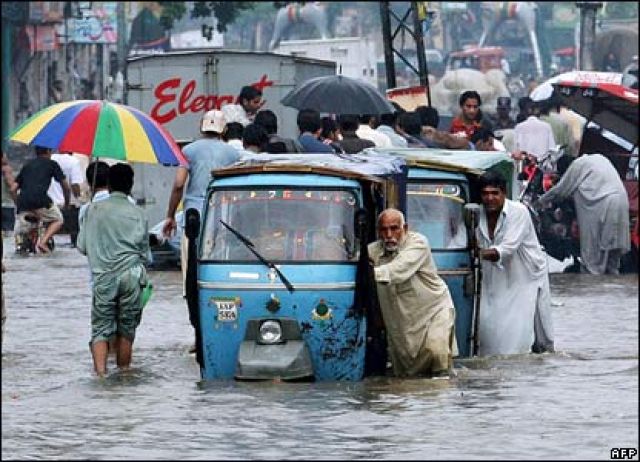
With floods caused by the heaviest ever recorded rainfall sweep down the Indus River toward the Arabian Sea, a fifth of Pakistan was under water by late August.
More than 16,000 people have been killed and 20 million displaced. The death toll is likely to rise due to hunger and disease. Food insecurity and malnutrition were endemic in Pakistan before the catastrophe.
On August 25, the United Nations reported 120,000 cases of suspected dengue fever and malaria and more than 600,000 cases of acute diarrhoea.
The outlook for farmers who have lost all means of livelihood is grim.
Pakistani and US military installations were evacuated before the floods hit, and members of the rural elite were rescued by the army. But the impoverished rural majority have been left to fend for themselves.
The $150 million in aid pledged by the US will benefit US corporate interests. AFP reported on August 25 that US ambassador to Pakistan Anne Patterson told a conference organised by the US Chamber of Commerce that day: “Perhaps it's a little insensitive to talk about this now, but I do want to mention that I think this will provide opportunities for American business as we try to build back better.”
The US and Australia have both deployed military forces to distribute aid. Meanwhile, the undeclared war against Pakistan continues.
ABC News reported on August 24 that a US pilotless drone killed 20 people in North Waziristan the previous day.
DNAIndia.com reported on August 19 that the US predators had “carried out a record number of 50 drone strikes inside the Pakistani tribal belt in the first seven months of the year”. The article said 13 alleged terrorists from al-Qaeda and the Taliban had been killed “at the cost of 476 innocent civilians”.
The international response has been weak, but Pakistani grassroots activists have initiated their own relief work, soliciting funds from ordinary people in Pakistan and abroad.
The Labour Relief Committee (LRC) brings together the Women Workers Help Line, Labour Education Foundation, Pakistan Kissan Rabita Committee, CATDM Pakistan, Progressive Youth Front, Labour Party Pakistan, National Trade Union Federation and Pakistan for Palestine.
The LRC has helped set up relief camps for displaced people and has helped rescue stranded survivors.
On August 13, 10 Indian peace activists arrived with donations collected in India. Pakistani trade unionists joined the Indians in chants of “Long live peoples friendship of India and Pakistan! We want peace not war! Welcome Indian friends! Reduce the army budget on both sides!”
A statement from the Sindh Labour Relief Committee posted at Laborpakistan.org said: “The affected populations are in a dire state — an already impoverished people have lost all of their belongings, including homes, farms, crops, and cattle.
“The army and the government have engaged in sporadic intervention, and have declared the handling of the crisis beyond their capabilities. NGOs and individuals have done what they can to fill the void. But nothing, of course, can ever be sufficient.
“Reports from the ground suggest that only a small fraction of the affected have been housed in temporary camps — the rest are sitting out in the open by the roadside, on railway tracks, and bridges, with nothing more than the clothes on their backs.
“All are at high risk of hunger, and water-borne diseases. There are reports of increasing desperation — food trucks and convoys run by NGOs were attacked near Shikarpur and Kashmore on the Guddu Barrage.
“On Sunday a protest erupted at a government relief camp in Sukkur, after a resident died of hunger.
“Big landlords have, in several cases, worsened the crisis by diverting water towards poorer localities in order to protect their own land.”
[Donations from Australia to the Labour Relief Committee can be made through the trade union aid agency APHEDA.]